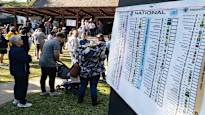The first predictions about the election result were published in the afternoon in the South African media.
13:17•Updated 13:25
The private news channel eNCA is the first South African media to predict that the ruling ANC party will lose its absolute majority in parliament.
According to the channel’s forecast, as a result of yesterday’s elections, the ANC, or African National Congress, would receive 45 percent of the votes, the Democratic Alliance 21 and the radical EFF party 11. The graphics of the forecast can be seen in the X update below.
The forecast of the local broadcasting company SABC is similar. According to it, the ANC would get about 42 percent of the vote.
The CSIR research institute, which made the forecast for the SABC, says that the margin of error is +/- two percentage points.
If the election result remains as predicted, it will also be in line with opinion polls conducted before the election. Before the elections, a third of the voters were still unsure of their choice, which is why the predictions were uncertain.
Mandela’s legacy is melting
The deceased Nelson Mandela the legacy ANC has ruled South Africa with an absolute majority since 1994, when the country held its first democratic elections after the end of apartheid.
In South Africa, however, a whole generation has grown up to the threshold of middle age since the end of apartheid.
The election seems to show that the legacy of the fight against racial oppression no longer weighs on her in the same way as it did for her parents.
South Africa is weighed down by unemployment, crime and a lack of basic services. For example, Nelson Mandela’s hometown Qunu in Ita-Kapi has not had a functioning water system since 2016.
All over the country, electricity is rationed and residents have had to adapt to outages lasting several hours almost every day.
The voters seem to have now sent a message to the ANC that it has had 30 years to get these things right.
In official in the vote count by Thursday afternoon, 3,879 polling stations had reported their results. There are 23,293 voting areas.
At that point in the calculation, the ANC had 42.48 of the votes, the Democratic Union 25.76 and the EFF 8.5 percent. In the previous elections, the ANC’s support was 57.5 percent.
The final result will be confirmed by the weekend at the latest. After that, the ANC either forms a coalition government or tries to continue ruling the country in a minority government, obtaining support from other parties for its proposals on a case-by-case basis.
The new parliament also elects the country’s president.
AFP, Reuters
